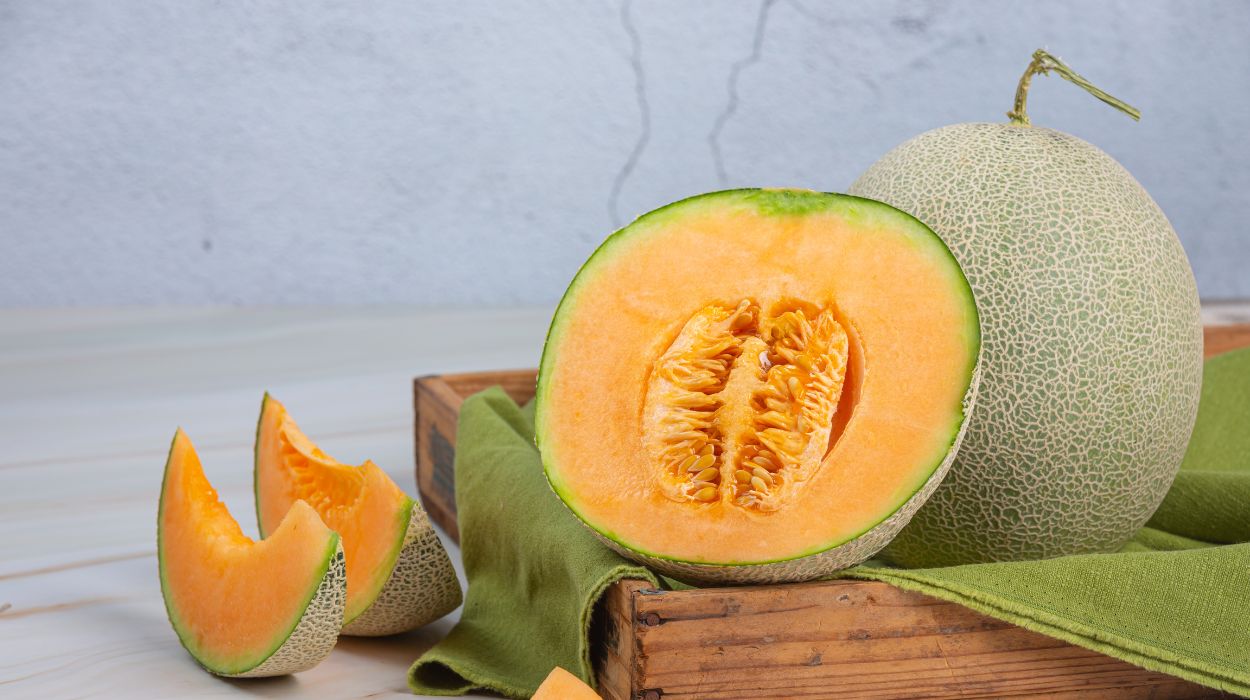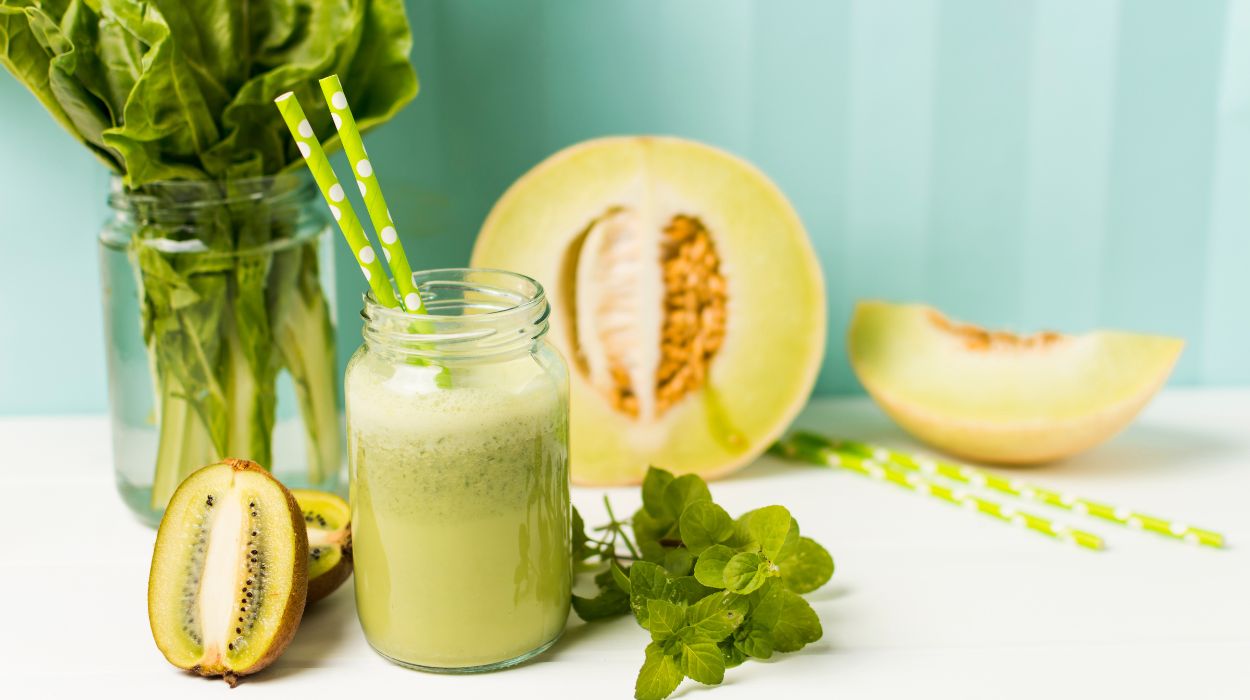 Expert's opinion
Expert's opinion
Expert's opinion
The article is a subjective view on this topic written by writers specializing in medical writing.
It may reflect on a personal journey surrounding struggles with an illness or medical condition, involve product comparisons, diet considerations, or other health-related opinions.
Although the view is entirely that of the writer, it is based on academic experiences and scientific research they have conducted; it is fact-checked by a team of degreed medical experts, and validated by sources attached to the article.
The numbers in parenthesis (1,2,3) will take you to clickable links to related scientific papers.
7 Cantaloupe Benefits, Nutrition & Ways To Eat In 2024

With many food options available, it can be hard to navigate which foods are healthy and will provide the most health benefits. One fruit you could consider trying is cantaloupe! Not only is cantaloupe a delicious fruit known for its sweet flavor and aroma, but the health benefits of cantaloupe are also outstanding and have even been shown to be good for weight loss.
Stunning Health Benefits Of Cantaloupe
- Improve cognitive function.
- Improve eye health.
- Manage arthritis.
- Prevent cardiovascular disease.
- Prevent stroke.
- Improve digestive health.
- Prevent cancer.
Cantaloupe Benefits: Amazing Health Benefits Of Eating Cantaloupe
Cantaloupe is one of the most popular fruits worldwide due to its sweet taste, juicy and firm texture, and high nutritional value of its orange flesh. They are part of the Cucurbitaceae family. The Cucumis melo var. reticulus variety can be found in the United States and some parts of Canada, while the Cucumis melo var. cantalupenis variety is most commonly found in Europe and Asia.
Due to the high nutritional value of cantaloupe, it provides an abundant source of many essential nutrients. While we know that cantaloupe provides many benefits for our heart, digestion, hydration, eyes, cognition, hair, and skin, is cantaloupe good for you and your health? Fortunately, many health benefits have been associated with the consumption of cantaloupes!
Improve Cognitive Function
Beta carotene is a precursor for vitamin A which is an essential fat-soluble vitamin. Beta carotene is found in many fruits and vegetables, including cantaloupes.
A randomized controlled trial[1] utilized data from the Physicians`Health Study II to determine associations between beta carotene supplementation and cognitive function. A total of 5,956 participants were included in the study and results determined that long-term beta carotene supplementation was associated with slightly better cognitive benefits, including verbal memory.
The authors noted that although the cognitive benefits are modest, even small improvements in cognitive function can have an influence on the risk of dementia. The same association was not found with short-term beta carotene supplementation of 3 years or less.
A more recent 2020 review[2] further explored the association between vitamin A and cognition. The review determined that vitamin A deficiencies can result in the deterioration of cognitive functions and that vitamin A is essential for brain functions, including areas involved in learning and memory.
Improve Eye Health
A 2013 review[3] and a 2022 review[4] assessed the association between the specific carotenoids, lutein, and zeaxanthin, on eye health. Lutein and zeaxanthin are carotenoids with no vitamin A activity. However, they still provide health benefits and are abundant in cantaloupe. These health benefits relate to eye tissue and include preventing and reducing cataracts and age-related macular degeneration.
Manage Arthritis
Beta carotene has also been proven to reduce inflammation[5] diseases, such as gouty arthritis. Specifically, beta carotene was shown to inhibit NLRP3 inflammasome in cell systems and animal studies. NLRP3 inflammasome is associated with the pathology of acute gout, so these results are promising.
Prevent Cardiovascular Disease
Another great benefit of cantaloupe is that it is a source of dietary fiber. A recent 2022 systematic review and meta-analyses[6] found after assessing three prospective studies and 12 clinical trials that higher dietary fiber intake is associated with a reduction in all-cause mortality associated with cardiovascular disease, total cholesterol, low-density lipoprotein (LDL) cholesterol, systolic blood pressure, and diastolic blood pressure. These findings indicate the inclusion of foods rich in dietary fiber, such as cantaloupe, is excellent for your heart health and, thus, the prevention of cardiovascular heart disease (CVD).
A recent 2022 study on the effects of carotenoids on CVD[7] demonstrated a modulatory protective effect on the heart relative to oxidative stress and lipid levels. Effects were more pronounced in those subjects who also had metabolic syndrome.
Prevent Stroke
In addition to the heart health benefits of cantaloupe, there are also benefits associated with stroke reduction! A 2013 systematic review and meta-analyses[8] of 22 randomized controlled trials and 11 cohort studies determined that higher potassium intake reduces blood pressure in individuals with high blood pressure and lowers one’s risk of a stroke.
A more recent 2022 study,[9] which included 180,159 participants, supported those findings as the study also concluded that a high potassium diet was associated with a reduced risk of stroke, CVD, and coronary heart disease.
Improve Digestive Health
Cantaloupes are a great food to try if you suffer from irritable bowel syndrome (IBS), colitis, or Crohn’s Disease. Cantaloupes are a low-fodmap fruit meaning they are low in certain carbohydrates that can cause abdominal pain, bloating gas, and diarrhea or constipation in individuals with sensitive digestion.
Prevent Cancer
Phenolic contents and antioxidant activity can also be found within cantaloupes. A 2010 study[10] and a 2018 study[11] assessed the phenolic content and antioxidant activity within extracts of cantaloupe leaf, stem, skin, seeds, and flesh. This was studied as phenolic compounds are antioxidants, and antioxidant activity involves defending the body from free radicals. Free radicals can cause cell structural damage, tissue injury, or gene mutations, which can result in various health problems, including cancer, CVD, and arthritis.
The highest phenolic content and flavonoid content was found in the leaf extract. These results indicate that methanolic extracts of cantaloupe leaves and seeds may be a powerful antioxidant in food or nutraceuticals.
While you obviously won’t be consuming the benefits of cantaloupe seeds or stems as a nutritious snack, there is still an indication that consuming cantaloupe can provide a protective effect against cancer. A 2012 study[12] found that if the U.S. population were to increase their fruit and vegetable consumption by only one serving per day, there would be an estimated population reduction in cancer cases by 20,000 each year.
So, be sure to include fruits and vegetables in your diet and consider adding cantaloupe in there as well, allowing you to gain all the benefits of cantaloupe juice and flesh. Also, while consuming whole fruits and vegetables is always essential to good health, you could also consider taking fruit and vegetable supplements to complement your dietary intake.
Cantaloupe Nutrition Facts

Considering all the many health benefits cantaloupe provides, it is no surprise that it is a very nutrient-dense fruit!
Listed below are cantaloupe nutrition facts[13] based on 1 cup of cubed melon (160 grams):
- Energy (calorie): 54.4 kilocalories (kcal)
- Water: 140 grams
- Protein: 1.3 grams
- Fat: 0.3 grams
- Carbohydrates: 13.1 grams
- Fiber: 1.4 grams
- Potassium: 427 milligrams
- Vitamin C: 58.7 mg
- Beta carotene: 3,230 micrograms
- Folate: 33.6 micrograms
Cantaloupe is rich in potassium, ascorbic acid or vitamin C, beta carotene, and folate. It is low in calories meaning each cantaloupe calorie is jam-packed with nutrients. It also has a high water content making it an excellent food for hydration.
Potential Side Effects
Hyperkalemia
Hyperkalemia is a condition caused by too much potassium in the blood. While your body needs potassium to function properly, and the health benefits of potassium were described earlier in this article, it is possible to have too much. Non-dietary circumstances, such as kidney disease and certain medications, can cause hyperkalemia. However, it can also be caused by consuming a diet too high in potassium.
The best way to avoid consuming a diet that is too high in potassium is to eat a balanced diet that includes a variety of fruits, vegetables, proteins, and whole grains. If you consume too much potassium and have hyperkalemia, symptoms you may experience include muscle weakness, numbness, tingling, and nausea. More severe symptoms that can occur if hyperkalemia is sudden are heart palpitations, shortness of breath, chest pain, nausea, and vomiting.
The recommended dietary allowance[14] (RDA) for potassium is 2,600 mg for women and 3,400 mg for men. A serving of cantaloupe has only 427 mg of potassium, so it is unlikely if you are healthy, you will overdose on potassium from eating cantaloupe.
If you have concerns about the quantity of potassium in your diet, you should connect with your primary healthcare provider or a registered dietitian.
Foodborne Illness
Food safety considerations should be taken when consuming cantaloupe, as they have been reported to be responsible for several foodborne illness outbreaks worldwide. Cantaloupes are at risk for foodborne illness because they can become contaminated with pathogens during production through to distribution. Due to the surface texture of cantaloupe, they are difficult to clean. Using a vegetable brush to scrub the exterior of the fruit prior to cutting it will cut down on the surface of bacteria.
The bacteria that are most commonly found on cantaloupes is the Salmonella species. Salmonella[15] is known to make people sick with diarrhea, fever, and stomach cramps. More severe infections can spread to your urine, blood, bones, joints, or nervous systems and result in severe disease. If you think you have Salmonella you should seek medical attention.
Since cantaloupes are generally consumed raw, they are at high risk of foodborne illnesses since no cooking will occur, which generally kills bacteria. To ensure your safety, you should always wash your cantaloupe’s exterior with a vegetable brush before eating or cutting into it.
Healthy Ways To Eat Cantaloupe

Cantaloupe is a nutritious fruit that can add a burst of flavor and color to any meal or snack! Try out some of the meal and snack ideas below and see what ways you enjoy!
Breakfast
- Add diced ripe cantaloupe to yogurt parfait
- Add fresh or frozen cantaloupe into a fruit smoothie
- Cut a cantaloupe in half, scoop out the seeds to make a bowl, and fill it with your choice of yogurt or smoothie
Lunch/Supper
- Add cantaloupes to any salad as a pop of color and flavor
- Grill cantaloupe as a side dish
- Pair cantaloupe with prosciutto or other deli meat as an appetizer
Dessert/Snacks
- Make fruit salad with cantaloupe
- Cut up ripe cantaloupe wedges and season with lime, chili powers, and salt
- Make homemade cantaloupe sorbet!
The Bottom Line: Is Cantaloupe Good For You?
Cantaloupe is good for you! It is a flavorful fruit with numerous health benefits and can be incorporated into a healthy diet in many different and fun meals and snacks. It is a low-calorie, high-fiber fruit with several health benefits for a balanced lifestyle! Just be sure always to wash your cantaloupe well before eating!
+ 15 sources
Health Canal avoids using tertiary references. We have strict sourcing guidelines and rely on peer-reviewed studies, academic researches from medical associations and institutions. To ensure the accuracy of articles in Health Canal, you can read more about the editorial process here
- Grodstein, F. (2007). A Randomized Trial of Beta Carotene Supplementation and Cognitive Function in MenThe Physicians’ Health Study II. Archives of Internal Medicine, [online] 167(20), p.2184. doi:10.1001/archinte.167.20.2184.
- Annual Reviews. (2020). Vitamin A and Retinoic Acid in Cognition and Cognitive Disease. [online] Available at: https://www.annualreviews.org/doi/full/10.1146/annurev-nutr-122319-034227#_i23
- Abdel-Aal, E.-S., Akhtar, H., Zaheer, K. and Ali, R. (2013). Dietary Sources of Lutein and Zeaxanthin Carotenoids and Their Role in Eye Health. Nutrients, [online] 5(4), pp.1169–1185. doi:10.3390/nu5041169.
- Hammond, B.R. and Renzi-Hammond, L. (2022). The influence of the macular carotenoids on women’s eye and brain health. Nutritional Neuroscience, [online] pp.1–7. doi:10.1080/1028415x.2022.2084125.
- Yang, G., Lee, H.E., Moon, S., Ko, K.M., Koh, J.H., Seok, J.K., Min, J., Heo, T., Kang, H.C., Cho, Y., Lee, H.S., Fitzgerald, K.A. and Lee, J.Y. (2020). Direct Binding to NLRP3 Pyrin Domain as a Novel Strategy to Prevent NLRP3‐Driven Inflammation and Gouty Arthritis. Arthritis & Rheumatology, [online] 72(7), pp.1192–1202. doi:10.1002/art.41245.
- Reynolds, A.N., Akerman, A., Kumar, S., Diep Pham, H.T., Coffey, S. and Mann, J. (2022). Dietary fibre in hypertension and cardiovascular disease management: systematic review and meta-analyses. BMC Medicine, [online] 20(1). doi:10.1186/s12916-022-02328-x.
- Martini, D., Negrini, L., Marino, M., Riso, P., Del Bo, C. and Porrini, M. (2022). What Is the Current Direction of the Research on Carotenoids and Human Health? An Overview of Registered Clinical Trials. Nutrients, [online] 14(6), p.1191. doi:10.3390/nu14061191.
- Aburto, N.J., Hanson, S., Gutierrez, H., Hooper, L., Elliott, P. and Cappuccio, F.P. (2013). Effect of increased potassium intake on cardiovascular risk factors and disease: systematic review and meta-analyses. BMJ, [online] 346(apr03 3), pp.f1378–f1378. doi:10.1136/bmj.f1378.
- Wang, D.D., Li, Y., Nguyen, X.-M.T., Song, R.J., Ho, Y.-L., Hu, F.B., Willett, W.C., Wilson, P.W.F., Cho, K., Gaziano, J.M. and Djoussé, L. (2022). Dietary Sodium and Potassium Intake and Risk of Non-Fatal Cardiovascular Diseases: The Million Veteran Program. Nutrients, [online] 14(5), p.1121. doi:10.3390/nu14051121.
- Hajar Iqbal Ismail, Kim Wei Chan, Abdalbasit Mariod and Ismail, M. (2010). Phenolic content and antioxidant activity of cantaloupe (Cucumis melo) methanolic extracts. [online] ResearchGate. Available at: https://www.researchgate.net/publication/223065931_Phenolic_content_and_antioxidant_activity_of_cantaloupe_Cucumis_melo_methanolic_extracts
- Fundo, J.F., Miller, F.A., Garcia, E., Santos, J.R., Silva, C.L.M. and Brandão, T.R.S. (2017). Physicochemical characteristics, bioactive compounds and antioxidant activity in juice, pulp, peel and seeds of Cantaloupe melon. Journal of Food Measurement and Characterization, [online] 12(1), pp.292–300. doi:10.1007/s11694-017-9640-0.
- Reiss, R., Johnston, J., Tucker, K., DeSesso, J.M. and Keen, C.L. (2012). Estimation of cancer risks and benefits associated with a potential increased consumption of fruits and vegetables. Food and Chemical Toxicology, [online] 50(12), pp.4421–4427. doi:10.1016/j.fct.2012.08.055.
- Usda.gov. (2022). FoodData Central. [online] Available at: https://fdc.nal.usda.gov/fdc-app.html#/food-details/169092/nutrients
- Nih.gov. (2019). Office of Dietary Supplements – Potassium. [online] Available at: https://ods.od.nih.gov/factsheets/Potassium-HealthProfessional/
- Anon, (2022). Questions and Answers. [online] Available at: https://www.cdc.gov/salmonella/general/index.html

